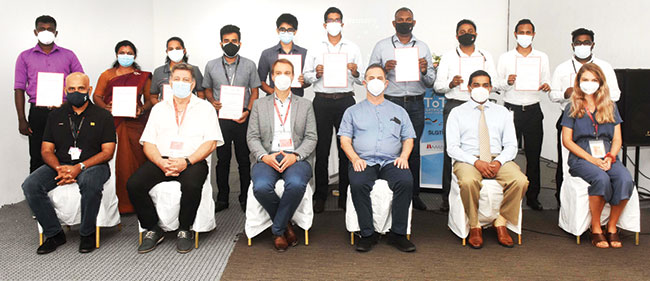Business
Germany supporting Sri Lanka to keep up with latest technological developments in apparel sector

At present, Sri Lanka accounts for around 1% of the global market share of apparel exports, and Sri Lanka’s apparel sector is well positioned to reach the industry’s target of $8 billion in export earnings by 2025. With these targets in sight, Sri Lanka’s apparel sector will have very high demands for skilled technicians, especially in the area of mechatronics, where the industry is moving into advance factory automations.
In order to fulfill the demand of qualified workforce in the apparel sector, Deutsche Gesellschaft für Internationale Zusammenarbeit (GIZ) GmbH- Vocational Training in Sri Lanka project on behalf of the German Federal Ministry for Economic Cooperation and Development (BMZ) partnered with Sri Lanka German Technical Institute (SLGTI) and MAS Holdings (Pvt) Ltd to commence a NVQ Level 5 Autonomation technician course to provide advanced theoretical and practical hands-on training for youth to work with the latest state-of-the-art machinery.
Prior to the commencement of the training, a Training of Trainer (ToT) course was conducted for in-company trainers at MAS in order to prepare and structure the two year training programme. In-company trainers who successfully completed the training received their certificates at the MAS Intimates facility in Ratmalana.
Speaking at the certificate awarding ceremony, Chairman of the SLGTI and CGTTI Vinod Moonesinghe said, “So far we have followed the practices from 19th century training in technical field work. It has always been a question of people going into technical colleges, theoretical learning, learning from the practice and then being thrown into the industry. Recently we have found out that this model lacks a lot. We are taking off to an entirely new trajectory as far as training is concerned. We need to train people specifically for the jobs that they will be doing in the industry. Then only we can address the job market as well as bring best overall results of the trainings”, Mr Moonesinghe said.
Head of Project, Vocational Training in Sri Lanka Project (VTSL), Mathis Hemberger said, “The philosophy of German engagement has always been to foster cooperative training where not just training institutes in the TVET sector produce the right skills, but private sector and TVET institutes jointly take the responsibility and add value. This partnership that exists between SLGTI, MAS and GIZ is a flagship example where public sector, private sector and development partners come together, join forces and create something that really has added value”.
The cooperative training approach based on the German dual system combines the advantages of two training modes (theory and industrial on-the-job training (OJT) in an integrated and coordinated process, with emphasis on the practical skills required at the shop floor. In such type of training, MAS as the industry partner and SLGTI as the public partner will share their expertise, facilities, and other specialized resources and establish a linkage between vocational training and industry.
Director-Innovation, MAS Intimates, Dr Chandika Wickramatillake said, “There’s a huge demand in MAS. We are looking to move from traditional apparel manufacturing to smart technologically advanced apparel manufacturing. We have very experienced mechanics and during the last five years, we have invested a lot in engineers. However, we have observed that there’s still a gap between mechanics and engineers, creating a need for technicians. This is a perfect time because we are looking at strengthening our staff capabilities at our factories. MAS is an international company having an ever growing global presence. These students who come from our villages will be exposed to latest technology and developments in apparel manufacturing and we need to support them. The trainers who received the certificates today have a big role to play in keeping up with technological developments, to learn and disseminate their learnings to these students. We find a lot of communication gaps because the students come from rural areas”, Dr Wickramatillake said.
Business
Trump heads to Saudi Arabia eyeing more investment in US

With US President Donald Trump due to visit Gulf states this week, a key focus will be securing significant new investment for the US economy.
“President Trump wants the announcement [of more Gulf money for the US],” says economist Karen Young, a senior fellow at the Middle East Institute think tank.
“He wants to have a big poster in a meeting that describes where these investments might go. And some estimation of what they will do to the American economy in terms of job creation or his big push, of course, on domestic manufacturing.”
Trump is due to arrive in the Saudi capital, Riyadh, on Tuesday 13 May, to meet the country’s de facto leader Crown Prince Mohammed bin Salman.
Trump is then expected to attend a summit of Gulf leaders in the city on 14 May, before travelling to Qatar that same day, and then ending his three-day trip in the United Arab Emirates (UAE) on 15 May.
The economic importance of the region to Trump is highlighted by the fact that the visit to Saudi Arabia was due to be the first overseas trip of his second term in the White House. That was before the death of Pope Francis necessitated Trump attending his funeral in Rome towards the end of April.
Saudi Arabia was also the first country that Trump visited during his first term of office, going against the modern practise of US presidents to start with the UK, Canada or Mexico.

Securing new investments in the US from Gulf states, and particularly from their state-backed sovereign wealth funds, will help Trump to signal back home that his “America First” agenda is delivering results.
The presidential visit is drawing top Wall Street and Silicon Valley leaders to Saudi Arabia. A Saudi-US investment forum on 13 May in Riyadh will feature CEOs from BlackRock, Palantir, Citigroup, IBM, Qualcomm, Alphabet, and Franklin Templeton.
The push comes amid economic headwinds, as President Trump’s new import tariffs have significantly disrupted global trade, confidence, and the US economy itself. US economic output fell in the first three months of this year, its first fall in three years.
Back in January, Prince Mohammed said that Saudi Arabia would invest $600bn (£450bn) in the US over the next years. However, Trump has already said that he’d like that to rise to $ 1tn, including purchases of more US military equipment.
According to Ali Shihabi – a Saudi commentator and author, with close ties to the Saudi government – a number of economic agreements will be signed during the trip.
“These deals will further integrate the Saudi and US economies together, joint ventures in the kingdom, in the United States, procurements of American weapons and goods,” says Mr Shihabi.
Saudi Arabia’s sovereign wealth fund, the Public Investment fund (PIF), which controls assets worth $925bn, already has numerous investments in the US. These include Uber, gaming firm Electronic Arts, and electric car firm Lucid.
Meanwhile, the UAE has already committed to investing $1.4tn in the US over the next 10 years, in sectors such as AI, semiconductors, energy and manufacturing. This was announced by the White House in March after the UAE’s national security advisor, Sheikh Tahnoon bin Zayed Al Nahyan, met President Trump in Washington.
Yet Ms Young from the Middle East Institute says that the scale of these investments is not realistic in the short term. She instead says that they are long-term strategic moves, and that the figures should be taken “with a little bit of a grain of salt”.
Regarding specific deals that could be announced during Trump’s visit, it is widely reported that Saudi Arabia will agree to buy more than $100bn of US arms and other military items.
These are said to include missiles, radar systems and transport aircraft.
The US has been a longstanding arms supplier to Saudi Arabia, but in 2021 the then Biden administration stopped selling Riyadh offensive weapons, citing concerns about the country’s role in the war in neighbouring Yemen.
The 2018 killing of Saudi journalist Jamal Khashoggi was also widely reported to be a factor. A US report said that Prince Mohammed had approved the murder.
The Biden White House resumed the sale of these weapons last year. While it cited that the Saudis had stopped bombing Yemen, some commentators said that the US was seeking Saudi assistance to help end the conflict in Gaza and aid its future reconstruction.

Mr Shihabi says Saudi Arabia will be seeking assurances from the White House that the US will implement a “more efficient procurement system”, enabling the Gulf state to access ammunition and military equipment far more quickly and easily.
“The Trump administration is initiating procedures to facilitate those deals. So, it’s expected that this process will improve immediately,” he adds.
Artificial intelligence is the other topic that will dominate the agenda during Mr Trump’s visit. Talks are expected to centre on attracting greater Gulf investment into US tech firms, and boosting the region’s access to cutting-edge American semiconductors.
The UAE and Saudi Arabia have been investing billions of dollars into tech and AI sectors as try to diversify their economies away from oil.
The Emiratis, in particular, are keen to establish themselves as a global AI hub.
Last week, the Trump administration scrapped the Biden-era chip regulations that placed restrictions on exports of advanced US chips to more than 120 countries including the Gulf states.
The White House is expected to draft new rules that would potentially involve direct negotiations with countries like the UAE.
“For the UAE, this is absolutely essential,” says Ms Young. “They are aggressively building out their AI capacity. So, for them getting access to US technology is imperative to be the best.”
While much attention will be on Trump courting Gulf capital for the US, Saudi Arabia is equally focused on drawing American investment into its ambitious Vision 2030 program.
Led by giant construction projects, such as the building of a linear city called The Line, Vision 2030 is central to the Saudi government’s continuing efforts to diversify the country’s economy away from oil.
It also involves pouring resources into entertainment, tourism, mining and sports.
However, foreign direct investment into Saudi Arabia declined for a third straight year in 2024, reflecting persistent challenges in attracting overseas capital.
The fall in global oil prices since the start of the year has further strained Riyadh’s finances, increasing pressure to either raise debt or cut spending to sustain its development goals.
Oil prices tumbled to a four-year low amid growing concerns that a trade war could dampen global economic growth.
The decline was further fuelled by the group of oil producing nations, Opec+, announcing plans to increase output.
Saudi Arabia is part of that group, and some commentators said that the rise was in part a desire to please Trump who has called for lower oil prices.
Other analysts said the reason was more that Opec+ remains confident that the global economy is growing.
The US-Saudi Business Council, is an organisation that aims to boost trade ties between the two countries.
It is hoping that Trump’s visit will push American businesses to explore more opportunities in Saudi Arabia, especially in sectors like AI, healthcare and education.
“The Saudi government is looking heavily to invest in these sectors. There is a very big appetite for Saudi companies to collaborate with American companies,” Hutham Al Jalal, who heads the Riyadh office for the organisation, tells the BBC.
Saudi officials are said to be confident that some deals in these sectors will be secured during Trump’s visit.
For Saudi Arabia, Trump’s visit is about strengthening ties with their longest-standing Western ally – a relationship that grew strained during the Biden years. For President Trump, it is about landing investment deals that can be framed as a win for his economic agenda.
“President Trump is looking for a headline of big investments in America, and he will get that from this trip,” adds Mr Shihabi.
[BBC]
Business
DMASL Digital Summit 2025 set for July 24-25 in Colombo

The Digital Marketing Association of Sri Lanka (DMASL) has announced the DMASL Digital Summit 2025, South Asia’s ‘most anticipated’ digital innovation forum, scheduled for July 24–25 in Colombo. Marking its third edition, the summit is poised to be the largest and most transformative yet, uniting many industry leaders, creators, and visionaries to shape the region’s digital future.
Under the theme “Where Asia’s Digital Minds Converge,” the 2025 summit amplifies its role as a catalyst for cross-border collaboration and cutting-edge strategies. This year’s agenda spotlights Asia’s rapid digital evolution, offering a dynamic platform for professionals driving transformation in marketing, technology, and commerce.
The event will feature the following.
Visionary keynotes from global pioneers in AI, data analytics, and digital commerce. Masterclass workshops on AI-driven marketing, omnichannel strategies, and ROI optimization. Interactive innovation zones featuring live tech demos, VR/AR experiences, and startup pitch sessions. Regional success stories through case studies from top brands and emerging disruptors and Hyper-targeted networking with C-suite executives, policymakers, and content creators.
Business
LIC Lanka secures Rs. 2 billion capital infusion from its Indian parent company

Timing aligns with Sri Lanka’s hunger for FDI and LICL’s ambition to shed its low-profile past
In a bold move signaling renewed confidence in Sri Lanka’s economic recovery, Life Insurance Corporation Lanka Ltd (LICL) has secured a Rs. 2 billion capital infusion from its Indian parent company (LIC of India), marking one of the largest foreign direct investments (FDI) in the island’s insurance sector this year.
The injection arrives as Sri Lanka has intensified its efforts to attract global capital while LICL is also positioning itself to reshape the underpenetrated life insurance market through aggressive expansion, tech upgrades, and innovative retirement plans targeting underserved workers in the private sector and in the informal economy.
LICL, a 23-year-old joint venture between LIC India (97% stakeholder) and Bartleet Transcapital (3%), plans to leverage the fresh funds to overhaul its IT infrastructure, streamline its 24-branch network, and launch private-sector retirement schemes – among other products including investment plans – tailored for informal and private-sector employees lacking retirement coverage.
LIC Lanka’s new MD/CEO Prameela Chittazhi Ramanadhan, a 27-year LIC India veteran, told The Island that the timing aligns with ‘Sri Lanka’s hunger for FDI’ and LICL’s ambition to shed its ‘low-profile’ past.
“This investment isn’t just capital. it’s a vote of confidence from our parent company in Sri Lanka’s potential,” Prameela asserted. “We’re addressing critical gaps: only 0.5% of GDP comes from life insurance, and millions lack pension safety nets. Our new products will redefine accessibility to this segment,” Prameela CR said.
A portion of the funds will modernise LICL’s digital infrastructure to fast track claims processing and customer service, a critical step as the insurer seeks to rebuild trust in a sector still scarred by the 1960s nationalisation of foreign firms.
“Trust is earned through consistency. In 23 years, not a single customer has accused us of unmet promises,” Prameela noted, hinting at upcoming campaigns showcasing client success stories.
LICL’s push comes amid lingering skepticism toward life insurance, partly rooted in societal beliefs. The 1961 nationalisation of insurers, which forced foreign players to exit, left a legacy of public wariness. Prameela CR acknowledged the challenge but expressed optimism: “We’ve operated here for decades without controversy. Now, we’ll be louder about our track record,” she said.
Prameela CR , a law graduate who rose through LIC India’s ranks since 1997, brings cross-functional experience to her role. Her strategy hinges on ‘localised innovation,’ blending LIC India’s global scale with targeted products for Sri Lanka’s ground realities.
Post-capital infusion, LIC Lanka is poised to be no longer the quiet player.
With insurance penetration languishing at 0.5% of GDP, far below regional peers like India (3.2%) – LICL’s gamble hinges on convincing Sri Lankans that life insurance isn’t a luxury but a necessity.
“The pension push could tap into growing anxiety over retirement security as the population ages,” LIC Lanka said.
As FDI-starved Sri Lanka watches, LICL’s Rs. 2 billion bet may prove a litmus test for foreign insurers eyeing the island’s untapped potential.
Industry analysts say LICL’s Indian pedigree could bolster its credibility. LIC India, the world’s third-strongest insurance brand, manages over $500 billion in assets, offering LICL technical expertise and actuarial firepower.
By Sanath Nanayakkare
-

 Business7 days ago
Business7 days agoAitken Spence Travels continues its leadership as the only Travelife-Certified DMC in Sri Lanka
-

 Latest News6 days ago
Latest News6 days agoNPP win Maharagama Urban Council
-

 Business7 days ago
Business7 days agoLinearSix and InsureMO® expand partnership
-

 Features2 days ago
Features2 days agoSAITM Graduates Overcome Adversity, Excel Despite Challenges
-

 Business5 days ago
Business5 days agoJohn Keells Properties and MullenLowe unveil “Minutes Away”
-

 Sports2 days ago
Sports2 days agoASBC Asian U22 and Youth Boxing Championships from Monday
-

 News2 days ago
News2 days agoDestined to be pope:Brother says Leo XIV always wanted to be a priest
-

 Foreign News3 days ago
Foreign News3 days agoMexico sues Google over ‘Gulf of America’ name change












